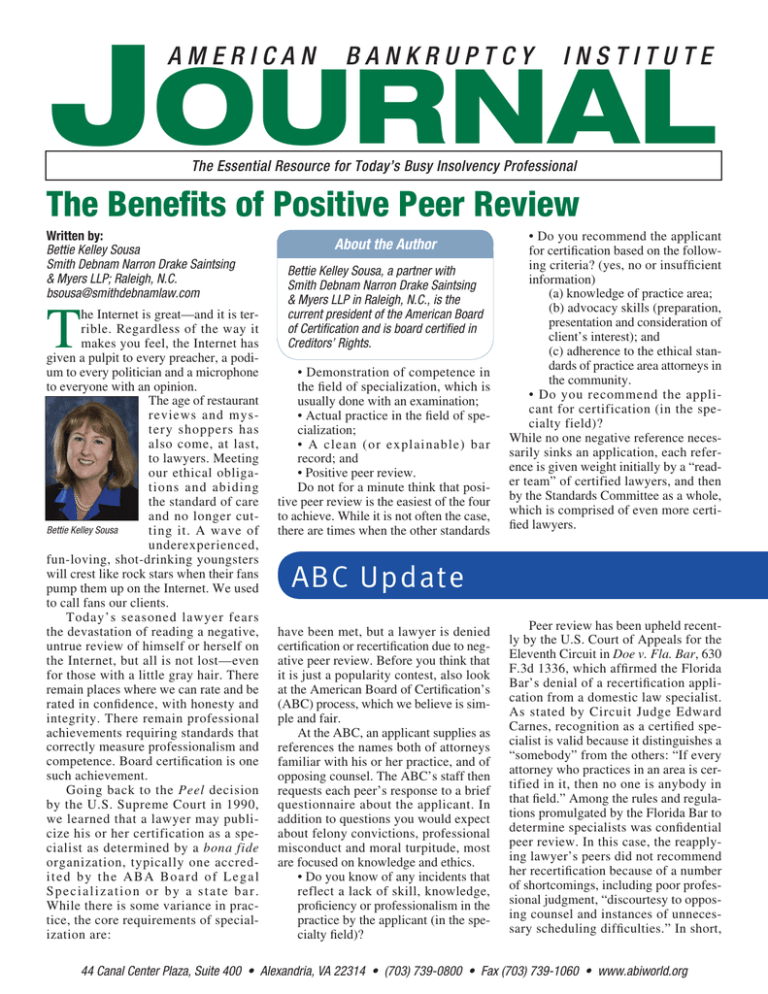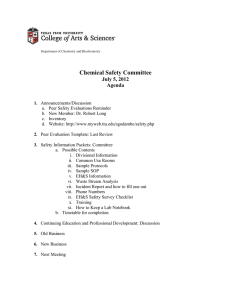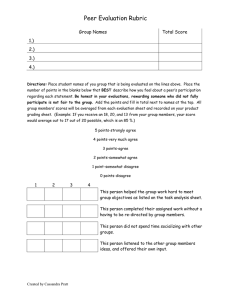J ournal
advertisement

Journal AMERICAN BANKRUPTCY INSTITUTE The Essential Resource for Today’s Busy Insolvency Professional The Benefits of Positive Peer Review Written by: Bettie Kelley Sousa Smith Debnam Narron Drake Saintsing & Myers LLP; Raleigh, N.C. bsousa@smithdebnamlaw.com T he Internet is great—and it is terrible. Regardless of the way it makes you feel, the Internet has given a pulpit to every preacher, a podium to every politician and a microphone to everyone with an opinion. The age of restaurant reviews and mystery shoppers has also come, at last, to lawyers. Meeting our ethical obligations and abiding the standard of care and no longer cutBettie Kelley Sousa ting it. A wave of underexperienced, fun-loving, shot-drinking youngsters will crest like rock stars when their fans pump them up on the Internet. We used to call fans our clients. Today’s seasoned lawyer fears the devastation of reading a negative, untrue review of himself or herself on the Internet, but all is not lost—even for those with a little gray hair. There remain places where we can rate and be rated in confidence, with honesty and integrity. There remain professional achievements requiring standards that correctly measure professionalism and competence. Board certification is one such achievement. Going back to the Peel decision by the U.S. Supreme Court in 1990, we learned that a lawyer may publicize his or her certification as a specialist as determined by a bona fide organization, typically one accredited by the ABA Board of Legal Specialization or by a state bar. While there is some variance in practice, the core requirements of specialization are: About the Author Bettie Kelley Sousa, a partner with Smith Debnam Narron Drake Saintsing & Myers LLP in Raleigh, N.C., is the current president of the American Board of Certification and is board certified in Creditors’ Rights. • Demonstration of competence in the field of specialization, which is usually done with an examination; • Actual practice in the field of specialization; • A clean (or explainable) bar record; and • Positive peer review. Do not for a minute think that positive peer review is the easiest of the four to achieve. While it is not often the case, there are times when the other standards • Do you recommend the applicant for certification based on the following criteria? (yes, no or insufficient information) (a) knowledge of practice area; (b) advocacy skills (preparation, presentation and consideration of client’s interest); and (c) adherence to the ethical standards of practice area attorneys in the community. • Do you recommend the applicant for certification (in the specialty field)? While no one negative reference necessarily sinks an application, each reference is given weight initially by a “reader team” of certified lawyers, and then by the Standards Committee as a whole, which is comprised of even more certified lawyers. ABC Update have been met, but a lawyer is denied certification or recertification due to negative peer review. Before you think that it is just a popularity contest, also look at the American Board of Certification’s (ABC) process, which we believe is simple and fair. At the ABC, an applicant supplies as references the names both of attorneys familiar with his or her practice, and of opposing counsel. The ABC’s staff then requests each peer’s response to a brief questionnaire about the applicant. In addition to questions you would expect about felony convictions, professional misconduct and moral turpitude, most are focused on knowledge and ethics. • Do you know of any incidents that reflect a lack of skill, knowledge, proficiency or professionalism in the practice by the applicant (in the specialty field)? Peer review has been upheld recently by the U.S. Court of Appeals for the Eleventh Circuit in Doe v. Fla. Bar, 630 F.3d 1336, which affirmed the Florida Bar’s denial of a recertification application from a domestic law specialist. As stated by Circuit Judge Edward Carnes, recognition as a certified specialist is valid because it distinguishes a “somebody” from the others: “If every attorney who practices in an area is certified in it, then no one is anybody in that field.” Among the rules and regulations promulgated by the Florida Bar to determine specialists was confidential peer review. In this case, the reapplying lawyer’s peers did not recommend her recertification because of a number of shortcomings, including poor professional judgment, “discourtesy to opposing counsel and instances of unnecessary scheduling difficulties.” In short, 44 Canal Center Plaza, Suite 400 • Alexandria, VA 22314 • (703) 739-0800 • Fax (703) 739-1060 • www.abiworld.org the Florida Bar determined that this lawyer’s numerous negative references from esteemed members of the judiciary and bar warranted the denial of recertification. Peer review worked. Psychologists tell us that there are many benefits to making nice. If we act hateful to our adversaries, we are feeling hate with every email, letter, motion hearing, trial and appeal. If we get to know our adversaries, we are less inclined to write off their ideas and compromises as unworkable. We enjoy our jobs better and do a better job when are not pulling punches, and in return, our peers may reward us in a way that matters—with positive peer review. n Reprinted with permission from the ABI Journal, Vol. XXX, No. 8, October 2011. The American Bankruptcy Institute is a multi-disciplinary, nonpartisan organization devoted to bankruptcy issues. ABI has more than 13,000 members, representing all facets of the insolvency field. For more information, visit ABI World at www. abiworld.org. 44 Canal Center Plaza, Suite 400 • Alexandria, VA 22314 • (703) 739-0800 • Fax (703) 739-1060 • www.abiworld.org




